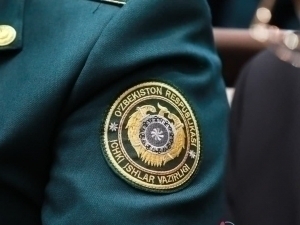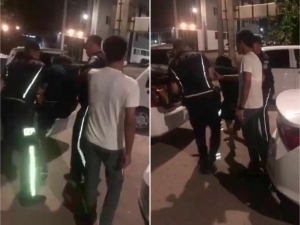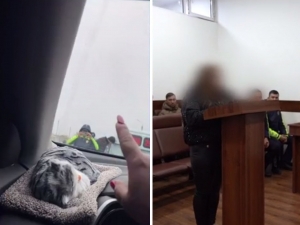Individuals distributing photos and videos with the intent to discredit employees of Internal Affairs Bodies may face imprisonment for up to 15 days
Local
−
28 November 2023 14099 7 minutes
In order to discredit law enforcement officers in Uzbekistan, it was proposed to introduce responsibility for posting photos and videos of their work on the Internet. This addition to the Code of Administrative Responsibility was discussed at the meeting of the Legislative Chamber of the Oliy Majlis held today, November 28.
In the draft law, the Ministry of Internal Affairs proposes to include a new Article 195-2 in the Code of Administrative Responsibility. According to it, posting photos and videos taken by the employees of the internal affairs bodies on the Internet to discredit or insult them will result in a fine of 50 times the amount of the base calculation or up to 15 days in prison.
At the meeting, MP Daniyar Ganiyev objected to this article, saying that it casts a shadow on the policy of openness and transparency pursued by the head of the country today.
"I believe that this is contrary to the noble policy of openness and transparency, which the honorable President has been conducting in recent years, that the people should serve the people and not the state agencies, and that there should be public control. In addition, this directly contradicts our laws 'On Internal Affairs Bodies' and 'On Openness of Activities of State Power and Management Bodies.' Our constitution also upholds freedom of information. These should be taken into account.
The most worrying thing is that if this norm comes into practice tomorrow, there will be some employees who abuse their position and discriminate against the rights and freedoms of citizens. They will misuse this norm tomorrow for other purposes. There is a danger that they will use it to violate the rights of citizens and treat them harshly. We think it will harm employee morale. No! This is counterproductive. Today, we want the employees of internal affairs bodies to become an institution that is a real supporter, friend, and protector of citizens. Such norms serve to replace respect for internal affairs bodies with disrespect, trust with suspicion, and love with hatred. Therefore, we should be very careful with this norm. I would also request our MPs to understand the essence of this norm when voting," says Deputy Daniyar Ganiyev.
Daniyar Ganiyev was not alone in this matter. Deputy Umidjon Jabbarov said that he did not support this addition to the Code of Administrative Responsibility from the beginning.
"I was completely against this article even in the conceptual discussion of the law. Discussions were also held yesterday. I thought about the substance again today. But there is one question: we know that there are five or six structures when it comes to law enforcement agencies. If we pay attention to the name of the law, we are talking about improving the traffic system. Logically, the direction of the substance does not cover this.
We are talking about law enforcement agencies... The article does not contain the phrase 'traffic.' Well, we take into account that there is a part of law enforcement agencies that regulates traffic. But the question arises that there is a different concept in the interpretation: 'photos and video images taken during the performance of official duties with the purpose of discrediting or insulting them.'
How to set this goal? The person taking the picture can say in court, 'I was taking it for a good purpose.
Secondly, in general, there is a decree by the President ("On the state program for the implementation of the development strategy of New Uzbekistan for 2022-2026 in the year of 'attention to people and quality education"), confirming the concept of public safety. The concept identified a problem, and its execution remains pending. The same issue is addressed in it, but instead of "insulting," the term used is "defamation." Therefore, based on this, Deputy Umidjon Jabbarov suggests removing the part about "insulting."
Speaker Nurdinjon Ismailov spoke with Jahangir Shirinov, chairman of the Committee on Combating Corruption and Judiciary, seeking an explanation about the law.
"Deputy Jabbarov's proposal has merit. Indeed, there were numerous objections to this article within the factions. They came to our committee and raised concerns. Some of our deputies stated that it was not right to introduce such a revised norm that does not align with the policy of openness.
Firstly, the project mentions the "purpose of defamation" but does not clarify its meaning.
Secondly, there are no laws prohibiting simply posting an image of a law enforcement officer on the Internet. Therefore, it is necessary to clearly define the offense. To achieve this, we need to specify what kind of action falls under the term "discredit."
For example, if we look at Article 192 of the Civil Code, the term "Discrediting a competitor" means "false, unclear, or distorted information. Additionally, the draft also addresses "insulting." However, Article 40 of the Code of Administrative Responsibility already covers liability for insult. Therefore, in the new version, removing the part about insult from Article 195-2 is suggested: When law enforcement officers perform their duties, i.e., duties related to ensuring public safety by placing photos and video images on the Internet with the purpose of discrediting them, that is, false, unclear, or distorted information. Such actions can be a discredit," says Shirinov.
Chairman of the lower house of parliament Ismailov mentioned that factions have been debating this article for a long time.
"Anyone can film, whether it is the driver or another third party. In the relationship between a law enforcement officer and an ordinary citizen, let him keep it to himself if necessary. Cars have video recorders; let him use it to prove his right in court or elsewhere. However, he should not post false, inaccurate, or distorted information, whether for ulterior motives or to discredit the office. With powerful tools like Photoshop, he can change colors, uniforms, clothes, add a beard, or even words. Artificial intelligence can manipulate audio. It is being discussed.
To be honest, this needs to be researched separately. But what they are saying is true; if they use it to discredit, they must be held accountable," said the speaker.
Deputy Daniyar Ganiyev again intervened in the debate, stating that if this law is adopted, it will be a special privilege for law enforcement officers. He added that in the future, a similar article might have to be developed for discrediting employees in other fields.
"Now it was said that 'insulting' will be removed and edited because it is in another article. But the question still remains: there is a separate article for 'discrediting through false information,' Article 202-2 (Code of Administrative Responsibility/Dissemination of false information). There is also responsibility for discrediting a person's dignity by spreading false information.
Now, if we open up one provision to one specific profession, it sets a precedent. Will we open to every single profession tomorrow? For discrediting doctors, for discrediting educators...
There is a general point here; there is responsibility for discrediting through false information. Whether he is an employee of a law enforcement agency, a doctor, a civil servant, or a person who has nothing to do with public service at all, he can easily be held accountable by existing norms. This is one.
Secondly, the sanctions are very severe. If you defame any person on the street, public servant, or not, through the media, you will pay a fine 50 times, and if he is a law enforcement officer, you can be imprisoned for 15 days.
Interestingly, even if you slander and are prosecuted under the relevant articles of the Criminal Code, only a fine, not imprisonment. However, if a video discrediting a law enforcement officer is distributed, it will be punished for 15 days, which is more severe than defamation," says Ganiyev.
Despite opposition, the law was passed in the third reading and sent to the Senate.
Live
All



